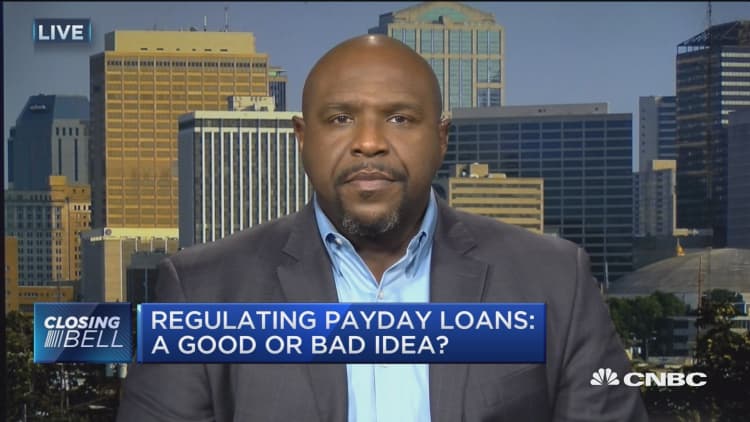
The federal government's plan to regulate payday loans is expected to change the operations of companies in the space — and create opportunities for start-ups.
New entrants now potentially will have a broader marketplace to operate within, thanks in part to the proliferation of smartphones.
As regulators clamp down on legacy players in the $38 billion market for payday loans, it's likely some will complain federal rules, including that they evaluate borrower ability to repay debt, are too onerous. It may put brick-and-mortar lenders out of business, despite their ability to charge what the Consumer Financial Protection Bureau called an annual percentage rate of nearly 400 percent.
"There's now a need for innovative services to fill the demand," said Alex Lin, head of Infocomm Investments, which backs financial technology — or fintech — companies. "The situation encourages the creation of such technology-driven innovative services to serve the greater unbanked group."
The key question is how.
One of the matters at the crux of the dual disruption payday lenders face from the feds and from fintech stems from the high rates they charge borrowers. The challenge for start-ups, which have typically geared loans toward borrowers with higher credit, is to charge reasonable rates to more risky customers without replicating abusive legacy industry practices.
Reducing the cost of borrowing to the consumer without imperiling financial services firms may depend on better technology and using more of it. Microsoft says its partnership with banking software firm Temenos helped bring banking services to 10 million unbanked people in just two years, according to a statement it provided to regulators in late May.
Another fintech pro, who asked to not be quoted, called annual percentage rates paid by consumers that reach into the hundreds abusive, but said that lenders to customers who often have the poorest credit are left with no choice but to charge high fees.
The other alternative would leave virtually any lending business struggling thanks to higher expected default rates for unbanked, or underbanked, consumers. But the CFPB first wants to stamp out abusive lending practices. The agency's plans to clamp down on lenders who only cater to consumers with the worst credit could temporarily freeze underbanked Americans out of the marketplace.
Read More
"By putting in place mainstream, common-sense lending standards, our proposal would prevent lenders from succeeding by setting up borrowers to fail," CFPB Director Richard Cordray said Thursday in a statement.
It doesn't yet address how borrowers will be able to borrow with a key source of credit — regardless of how costly — eliminated from their lives.

Fintech executives may look forward to federal intervention in payday lending, which is regulated effectively on a state-by-state basis, meaning that start-ups have to comply with different states' rules. This could have a company charging a borrower one rate in a certain ZIP code that would be considered unlawful in another. And unifying payday lending regulations under a common umbrella would simplify the rules start-ups face, giving them some flexibility they currently do not have.
At the same time, elements of the legacy payday lending market are being phased out by the government; they're also virtually worthless to fintech companies. Other elements of the legacy payday lending industry would be considered useless within the structure of many financial technology start-ups.
Read MoreTry this before you turn to a 390 percent payday loan
One of the things the CFPB aims to eliminate is lenders' ability to require a car's title as collateral. Fintech executives seem to agree that repossessing a used car after seeing a loan default offers no practical value to most companies.
Some in the fintech community argue that knowing their borrower should be a cornerstone of the budding industry.
"The notion that lenders should account for a borrower's ability to repay is what we consider to be responsible lending," said CommonBond CEO David Klein, adding, "any lending operating procedure is well served by doing it."


